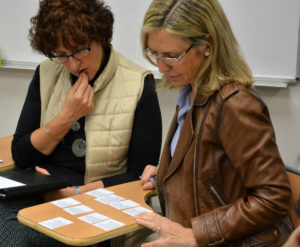Contemporary English
In-house teacher training
This course is also available online
1 week
Course Length
Flexible
Lesson Days
15
Lessons
English
Language
B1
Minimum Level
Overview
This course is for experienced teachers of English, with a good standard of English, working with secondary or adult students. You will explore the current trend in English language, giving you the chance to enhance your skills in areas such as teaching pronunciation or to explore areas that are perhaps new to you such as teaching with mobile technology.
The course will provide you with the opportunities to develop techniques by presenting practical ideas for teaching English. This unique structure enables you to experience a different dynamic by providing language development and practice as well as ideas for teaching the topics covered. These methods of teaching will allow you to cast aside the textbook whenever you can by approaching much more topic based on as little grammar as possible and by examining the current trends in the contemporary use of English, in Britain and internationally.
Completing this course will help you:
- Understand teenage language "slang and idiom"
- Understand trends in lexical change and new words
- Get an broad understanding of taboo and political correctness
- Exploit authentic materials
- Teaching with mobile technology
Who is the course for?
For teachers who want to explore the current trends in the English language and get knowledge of contemporary use of English, in Britain and internationally.
Course Sample programme
| Week 1 | Course Content |
| Day One | Language trends “teenage language slang and idiom” |
| Day Two | Lexical change and new words |
| Day Three | Understand the varieties of the English language/Teaching with mobile technology |
| Day Four | Language development and practice as well as ideas for teaching the topics covered. |
| Day Five | Review and Feedback |
*Please note that the course content may be subject to change due to latest methodology trends updates. 1 lesson=45mins
Share This Class:
What people are saying



In-House Training
You might also be interested in these courses

Supporting pupils with Special Educational Needs and Disabilities
This course develops the skills of those involved in the education of pupils with Special Educational Needs and/or Disabilities (SEND) so that these children…

Higher Order Thinking
Developing Higher Order Thinking requires teachers to establish with their student a knowledge base of thinking skills, reasoning, critical thought, and problem-solving…

Scaffolding
With our workshop “Scaffolding” you will understand in more details on how to support second language learners by providing helpful hints to help students…
More Courses in the UK, Ireland and Malta
You might also be interested in these courses

Technology for Language Teachers
Technology for Language teachers is aimed at teachers who want to use more technology in the classroom to enhance the learning experience of their students…

Teaching for Exam Classes
Teaching for Exam Classes is for English teachers who are preparing teenage or adult students for exams. Preparing to teach Cambridge or IELTS exam class. London…

Pronunciation and Performance with an expert “Adrian Underhill”
Pronunciation and Performance with an expert is a course led by a world-renowned ELT Consultant and Trainer. Adrian Underhill is an author and the series…
Methodologies

Total Physical Response
Total Physical Response is considered to be an excellent way of learning vocabulary. Moreover, since it is based on commands, the students can easily learn the meaning of the words in the target language.

The Structural Approach
This method is based on the opinion that it is imperative to understand the structures of the language. Understanding the complexities of the structures of the sentences in a language is more important than learning the vocabulary of the language.

The Direct Method
This method primarily focuses on the development of oral skills. One of the most important characteristic feature of this method is that visual materials and real-life objects are used. Moreover, such an oral training helps in reading and writing. There is no translation involved in this method.
